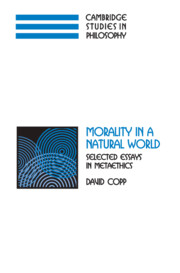Book contents
- Frontmatter
- Contents
- Preface
- Acknowledgments
- Introduction
- Part One Naturalism: Epistemology and Metaphysics
- 1 Why Naturalism?
- 2 Four Epistemological Challenges to Ethical Naturalism: Naturalized Epistemology and the First-Person Perspective
- 3 Moral Naturalism and Self-Evident Moral Truths
- 4 Moral Necessities in a Contingent World
- Part Two Referring to Moral Properties
- Part Three Naturalism and Normativity
- Index
- References
4 - Moral Necessities in a Contingent World
Published online by Cambridge University Press: 19 July 2009
- Frontmatter
- Contents
- Preface
- Acknowledgments
- Introduction
- Part One Naturalism: Epistemology and Metaphysics
- 1 Why Naturalism?
- 2 Four Epistemological Challenges to Ethical Naturalism: Naturalized Epistemology and the First-Person Perspective
- 3 Moral Naturalism and Self-Evident Moral Truths
- 4 Moral Necessities in a Contingent World
- Part Two Referring to Moral Properties
- Part Three Naturalism and Normativity
- Index
- References
Summary
INTRODUCTION
Certain moral propositions seem intuitively to be necessarily true. We think it would be wrong, other things being equal, to cause someone pain for no reason, to take pleasure in another's pain, to punish those known to be innocent, to taunt the vulnerable. We think it would be wrong to torture a baby to death just for fun. These propositions seem to be necessarily true – in some interesting sense of “necessary.” They seem to be “moral necessities,” as I will say. We do not countenance possible worlds in which they are false – except, perhaps, worlds that are radically different from ours in some crucial respect. We can call the worlds in which we take these propositions to be true the “morally relevant worlds” or “M-worlds” – and we can say that we view the propositions as “M-necessarily” true.
The moral principles proposed by normative moral theories are typically offered and treated as putative necessary truths. They are supposed to be immune to counter-examples, and it is standardly assumed that a counter-example need only be a possible case in which the principle implies something that is intuitively false. Consider, for example, a classical act-consequentialist principle according to which an agent is morally required to perform an act with consequences that are at least as good as the consequences of any alternative.
- Type
- Chapter
- Information
- Morality in a Natural WorldSelected Essays in Metaethics, pp. 113 - 150Publisher: Cambridge University PressPrint publication year: 2007



